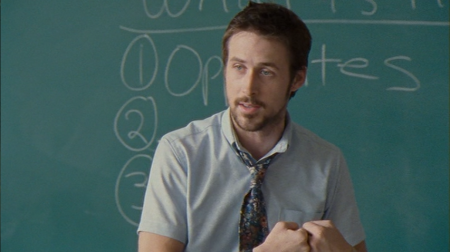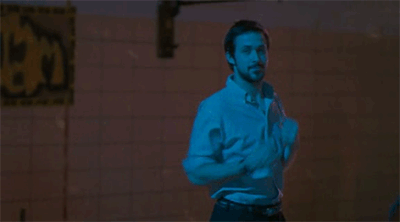Back to School Month - Here's Andrew "Abstew" on Half Nelson
What is History?

These are the first words spoken by Ryan Gosling in his Oscar-nominated performance in the 2006 film, Half Nelson. (Sadly, his only Oscar-nominated performance to date. I was so blown away by his work in this movie that I thought, for sure, he would have received at least another nomination, if not a win, by now) Gosling plays a Brooklyn middle school teacher named Dan Dunne that happens to wrestle (see where that title comes from?!) with a drug problem. Throughout the course of the film, he's even discovered by one of his students (an excellent Shareeka Epps as Drey) in a girls' bathroom stall, smoking crack – moments after a basketball game he just happened to be coaching.
Dan's struggles with addiction, while striving to be a better person, are the focus of the film and give an added depth to the "Teacher as Savior" genre. But I recently rewatched the film, focusing only on the scenes in the classroom. [more...]

(This is a Back to School month, after all, and not Complex Characters of Addiction month. Although, if we were talking about both, nothing beats that episode of "Saved By the Bell" where Jessie does speed), I discovered how well the film would have worked as a traditional classroom-set movie as well. Hip, young teacher that doesn't play by the rules that somehow isn't full of clichés? What's not to love?
With that simple question addressed to the students, he opens up a dialogue with the classroom (and the moviegoing audience). History isn't just about dates and facts as Dunne says.
 Hey, Girl. Ready for a date? No, not that kind...
Hey, Girl. Ready for a date? No, not that kind...
I wanna know why. I wanna know consequences. I wanna know what it means."
And his unconventional approach ("Have you even opened the Civil Rights Binder?" questions the principal) teaches the students to think for themselves giving them the necessary tools to advance in higher education.
My favorite teaching tool that he uses is when a student insults another student. Instead of detention or getting sent to the principal's office, the person being insulted gives the insultor a date in History. They then must do an oral report on a significant cultural event that occurred on that date. Thus the "punishment" becomes an additional opportunity to learn more. And the four reports in the film (presented below) are not only connected by stories of oppression and hatred caused by differences, but all four have inspired other film makers to "teach" these stories through the classroom of the movie theater.
* * *

On May 17, 1954, the Supreme Court ruled on the case of Brown vs. the Board of Education, making it illegal for states to segregate public schools. This was a major step forward in the struggle for racial justice and helped begin a flurry of bold and heroic actions known as the Civil Rights Movement.


The Civil Rights movement has been the subject of countless films and made-for-TV movies. Two of the most recent are Best Picture nominated The Help (in which the assassination of Civil Rights activist, Medgar Evers, adds a historical context to the story of maids in rural Mississippi) and Lee Daniels' The Butler in which the son of the titular butler finds himself involved in every historical aspect of the Civil Rights movement (seriously, how did he get around so much?). Both films were huge box office successes. It's hard to imagine that such laws were still in affect in this country as little as 60 years ago.
* * *

On September 13, 1971, 1,200 Attica State Prison inmates seized control of the prison and took hostages to negotiate changes to their inhumane conditions. Governor Nelson Rockefeller ordered a military assault on the prison, which killed twenty-nine inmates and ten hostages—every one caused from police gunshots. An official commission later stated, with the exception of Indian massacres in the late 19th century, the police assault was the bloodiest one-day encounter between Americans since the Civil War.


Attica has become synonymous with anything related to police brutality thanks in large part to Al Pacino in Dog Day Afternoon. After police begin to gather outside the bank he is robbing, Pacino's character begins to chant the prison's name, comparing the police presence to that of the jail riots. The incident would have been fresh in viewers minds as it only occurred 3 years earlier. The chant has been parodied in everything from Spongebob Squarepants to Its Always Sunny in Philadelphia.
* * *

On November 1, 1977, Harvey Milk was elected to the San Francisco Board of Supervisors. He was the first openly gay person to ever be elected to public office. A year later, he was assassinated by another member of the City Council named Dan White. Dan White claimed that he shot Milk because he ate too much junk food that day. This would later be known as the Twinkie Defense.
Is that for real?
The assassination of Harvey Milk was the subject of not only the Oscar-winning documentary, The Times of Harvey Milk (1984) but also Gus Van Sant's 2008 biopic Milk, that scored Sean Penn a Best Actor Oscar for his role as the politician and an Oscar for screenplay to openly gay writer, Dustin Lance Black. The film was nominated for 8 Oscar that year, including Best Picture. What I loved about the film is the use of real-life footage cut in with the Hollywood take on it. The scene at the end where the actual candlelight vigil is inserted along the staged version is especially powerful.
* * *

On September 11, 1973, the CIA helped overthrow and murder democratically elected Chilean president Salvador Allende. The military coup led to mass disappearances, assassinations and tortures of thousands of Chilean civilians under the leadership of U.S.-backed dictator Augusto Pinochet. Secretary of State Henry Kissinger said of Allende’s 1970 election, quote, “These issues are much too important for the Chilean voters to decide for themselves."


Today marks the 40th anniversary of the event that Drey reports on. Drey's defiant look into the camera is one of anger and disappointment. It seems she is angry at America for making such a decision at the time, in much the same way she is disappointed with Dan Dunne for not living up to her expectations. America, like Dunne, were infallible in her mind. But she soon discovers that her country, like her mentor, are capable of errors in judgement. Learning that lesson can be the hardest one of all.
The 1988 campaign to get Pinochet out of office through a democratic election is chronicled in last year's Chilean Oscar-nominated Foreign Language film, No. The film was shot on the same cameras used for television news in the 80s putting a unique spin on the historically-set film. Not that Dan Dunne is the type of teacher to show movies in the classroom, but part of me thinks he would have enjoyed showing No.


